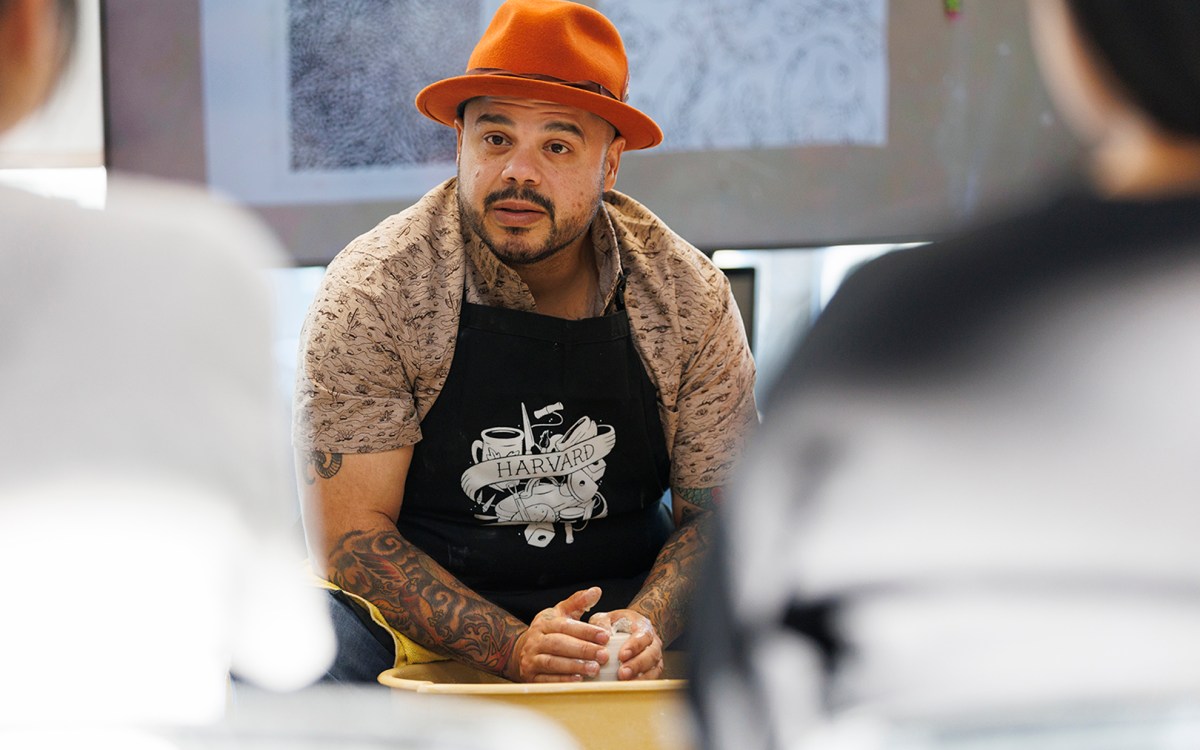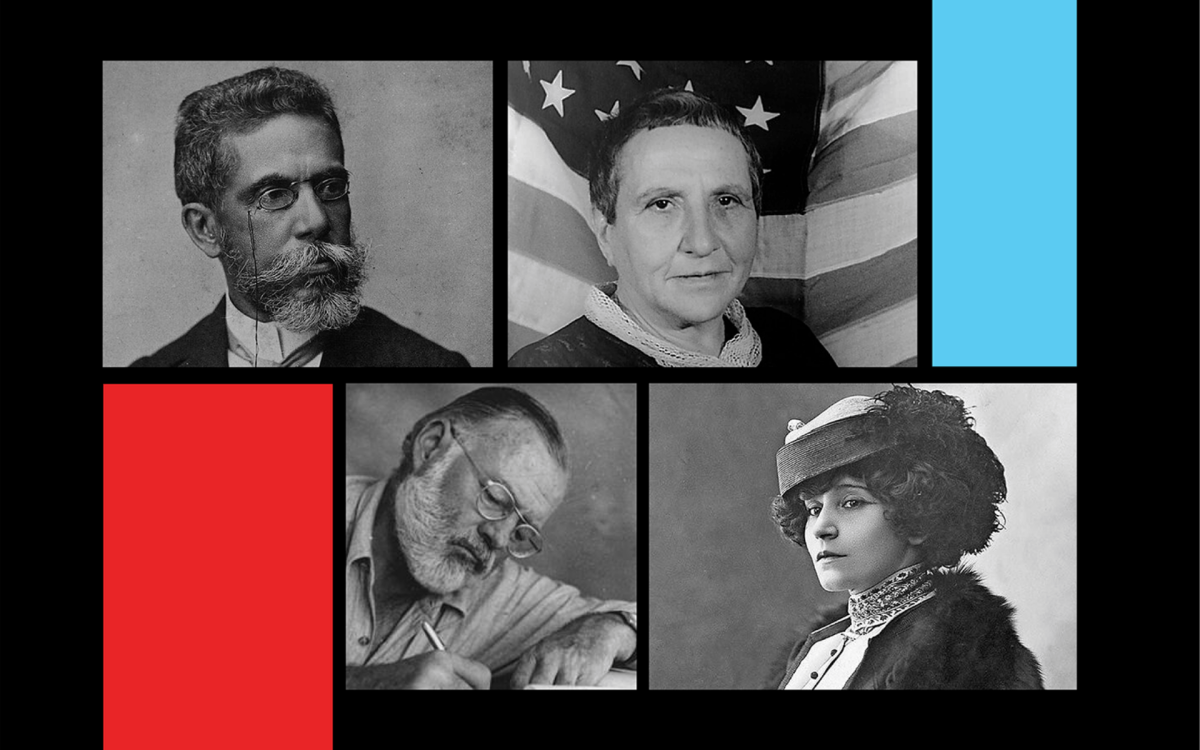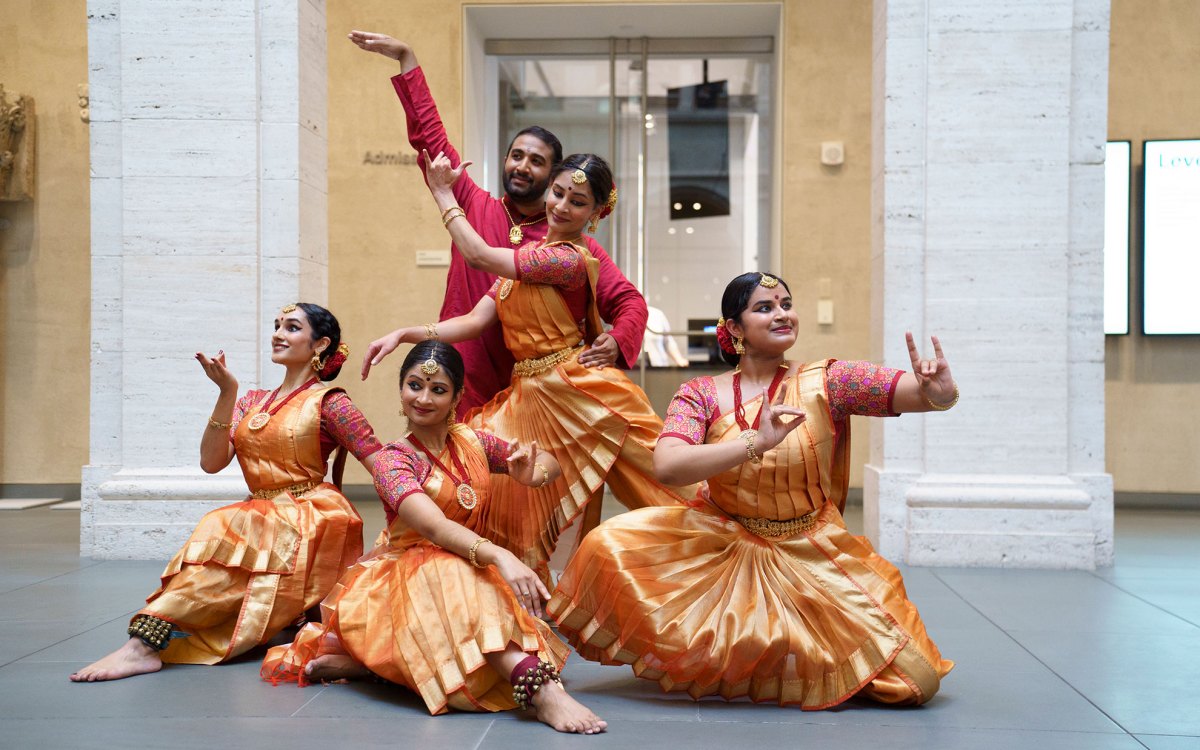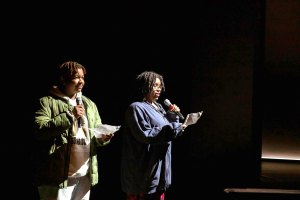Arts & Culture
-

Voice of a generation? Dylan’s is much more than that.
Classics professor who wrote ‘Why Bob Dylan Matters’ on the challenge of capturing a master of creative evasion
-

Holiday treats from the kitchen of Julia Child
Recipes from celebrity chef’s archive at Radcliffe
-

How a ‘guest’ in English language channels ‘outsider’ perspective into fiction
Laila Lalami talks about multilingualism, inspirations of everyday life, and why she starts a story in the middle
-

Potter gets fired up about helping students find their own gifts
Roberto Lugo says his art creates conversations and ‘that’s where the magic happens’
-

The 20th-century novel, from its corset to bomber jacket phase
In ‘Stranger Than Fiction,’ Edwin Frank chose 32 books to represent the period. He has some regrets.
-

Dance the audience can feel — through their phones
Engineer harnesses haptics to translate movement, make her art more accessible

-
Ghent Altarpiece is window into history of art
To Hugo van der Velden, professor of history of art and architecture in the Faculty of Arts and Sciences, the Ghent Altarpiece is more than a landmark — it’s also an excellent teaching tool. The painting is the focus of Van der Velden’s History of Art and Architecture course, “Jan van Eyck and the Rise of Painting.”
-
Houghton exhibit features Islamic sciences
If scholarship is the only reliable means of time travel, the Houghton Library offers up Harvard’s latest time machine: “Windows into Early Science,” an exhibit of scientific manuscripts, maps, and illustrated books on display through May 23.
-
Revitalizing Shanghai’s waterfront is challenging task
Alex Krieger, who teaches the GSD Urban Design Proseminar as well as design studios such as last spring’s “Reconnecting City & River: Vienna, Austria & the Danube,” also leads a class in the College’s Core curriculum on the design of the American city.
-
The complex legacy of slavery in Brazil
On Thursday (April 17), Lilia Moritz Schwarcz joined Zephyr Frank, assistant professor of Latin American history at Stanford University, for a lunchtime conversation about race in Brazil in both the era of the slave trade and today. The event, titled “Slavery, Abolition and Race in Brazil,” was part of an ongoing series in the Brazil Studies Program of the David Rockefeller Center for Latin American Studies.
-
The literary roots of human rights
The aim was determining the truth and the technique was torture. Pain was administered in secret, under strict guidelines, often with a judge and doctor present. Once a suspect confessed, the confession would have to be repeated in court.
-
Cultural creativity in the Ethiopian diaspora
A Radcliffe Fellow this year, Kaufman Shelemay was co-organizer of “Cultural Creativity in the Ethiopian American Diaspora,” a conference held at Harvard this week (April 13-14).
-
Hamlisch offers vital audition advice
The multigifted and much-admired musical composer Marvin Hamlisch taught a master class in the New College Theatre on “The Art of the Audition” recently (April 9) under the auspices of Learning From Performers.
-
Lens on politics: Life in Serbia, Kosovo
Impulse, activism, and perhaps a bit of naiveté. That’s what led Jeff Silva, a teaching assistant in the Department of Visual and Environmental Studies, to make his way to war-torn Belgrade just days after the NATO bombing campaign ended in June of 1999.
-
Bollywood under a lens
Richard Delacy, preceptor in Sanskrit and Indian studies, flicks off the lights in his classroom and cues the video projector. A few students shift in their seats as the opening credits for “Khalnayak,” a renowned Bollywood film, roll across the screen.
-
Iraqi film series offers rare glimpse into bleak world
Beginning today through Saturday (April 17-19), the Tsai Auditorium at the Center for Government and International Studies (CGIS) will host selections from the first international Iraq Short Film Festival (originally held in Baghdad in 2005).
-
South Africa’s ‘ace’
There are a thousand new HIV infections a day in South Africa, Pieter-Dirk Uys told an audience at Zero Arrow Theatre this week (April 14), during a public conversation sponsored by the Humanities Center at Harvard.
-
The perils of historical fiction
Pulitzer Prize-winning playwright Tony Kushner, author of the celebrated “Angels in America: A Gay Fantasia on National Themes,” delivered the Tanner Lectures at Harvard last week (April 9-11).
-
Ancient science, modern lens
Hanging on the wall in Boylston 232, between windows overlooking the southern edge of Tercentenary Theatre, two small photographs present an intricate view of distant, colorful nebulae. Mark Schiefsky, professor of the classics, captured both images with his telescope. He has been revisiting the hobby of astrophotography as of late, an old passion from his boyhood in Michigan.
-
Gender and religious scholarship
A few minutes into a conference last week at the Radcliffe Gymnasium, a building technician appeared on the balcony to open some windows. At the podium below, one of the presenters paused to say, “Air is good.”
-
Self discusses gender, feminism, privacy
Brown University cultural historian Robert O. Self — a Radcliffe Fellow this year — made a name for himself with his book “American Babylon” (Princeton University Press, 2003). He was the first scholar to connect the civil rights struggle with postwar white flight to the suburbs, and the tax incentives that made suburbanization possible.
-
Khan winners at Gund Hall
An exhibition featuring the winning projects of the Aga Khan Award for Architecture will run through May 21 in the gallery at Gund Hall, Harvard Graduate School of Design (GSD). The Aga Khan Program at the GSD and the Humanities Center at Harvard University organized the exhibition, in collaboration with the Aga Khan Award for Architecture, now in its 10th cycle (2005-07). The exhibit was curated by GSD Professor Hashim Sarkis.
-
Filmmaker literally deconstructs classic, avant-garde movies
For filmmakers, the visual image is vital. But movie producer Rebecca Baron is more interested in what you can’t see.
-
Martorell conducts his own sort of life class at Fogg
Shortly after unpacking his bags and setting up his easel, Antonio Martorell is ruminating on the philosophy of art. “The materials, as such, are as important as subject matter. They become subject matter themselves — they are matter and they matter.”
-
‘Embracing our own being’
Controversial pop artist Jeff Koons brought his unique perspective to the Carpenter Center Thursday night (April 3), speaking about his work and philosophy to an invited audience of just over 200.
-
Symposium held on ‘Olympic’ architecture
The Olympics are never just about sport. This summer’s Beijing Olympics have been emphatically about architecture, too. In preparation for the games this August, the Chinese capital is undergoing an urban transformation unprecedented in recent history.
-
Arts In brief
A.R.T. PRODUCTION UP FOR TOP AWARD LOCKWOOD, JUILLIARD STRING QUARTET TO EXPLORE BEETHOVEN
-
The story behind ‘Storied Walls’
In March 2001, Bill Saturno, a newly minted Harvard Ph.D., was in Guatemala searching for recently uncovered hieroglyphics as a research associate of the Peabody Museum. It turned out that his guides were overbooked and his planned expedition had to be canceled. As a sort of consolation prize, the company offered Saturno a three-hour Land Rover ride to San Bartolo in the Peten jungle, an area unexplored by archaeologists, to take a look at a Maya pyramid. Three hours turned into an overnight stay, then an arduous eight-hour hike in 100-degree heat to the pyramid.
-
Panel discusses paucity of designing women
Women in Design, a student group at the Harvard Graduate School of Design (GSD) that aims to increase the visibility of women in the field, kicked off its four-part spring symposium, “Progress in Process,” Thursday night (March 13) with a panel discussion on where women in architecture are now and where they are headed. Department of Architecture Chair Toshiko Mori moderated the event, which was held in Gund Hall’s Piper Auditorium and attracted a crowd of about 150 people — mostly, it was noted by panelists, women.
-
With old forms, improvisation, Bielawa creates ingenious anachronism
Manhattan composer Lisa Bielawa is a Radcliffe Fellow this year. Her tiny studio on Concord Avenue is spartan: white walls, a piano, a violin, two chairs, a table strewn with music staff paper. On one side is the glow of a computer. On the other is a single window, with a blur of trees beyond. But the little studio, as Shakespeare wrote of art, is such stuff that dreams are made on. The dream that Bielawa made at Radcliffe this year is “Double Violin Concerto,” a 24-minute composition that premieres in Boston next week (March 29). It pays homage to music’s past by reviving an old form. (Double concertos were last popular in Antonio Vivaldi’s 18th century.)
-
Conference brings out pacific potential of African hip-hop
Harvard and hip-hop. One is the famous university, the other the music style marked by rapping, rhyming, and a synthetic backbeat. Both begin with the letter “h.” Nothing else in common, right? Wrong. Harvard last week (March 13-15) hosted a three-day conference on African hip-hop, a musical style that experts say not only makes audiences move, but that moves audiences — toward education, civic action, and peaceful change.
-
African American National Biography launched
From Aaron, a former slave without a last name, through Paul Burgess Zuber, a 20th century lawyer and professor, the recently published African American National Biography (Oxford University Press, 2008) is the most extensive and inclusive collection of biographical information about African American lives ever published. The African American National Biography (AANB), co-edited by Henry Louis Gates Jr. and Evelyn Higginbotham, is an eight-volume series that includes biographies of more than 4,000 African Americans throughout 500 years, dating back to the arrival of Esteban, the first recorded African explorer to set foot in North America.
-
Thriving cities ‘connect smart people’
In a fast-paced lecture at the Harvard Graduate School of Design Thursday evening (March 6), Edward Glaeser, the Fred and Eleanor Glimp Professor of Economics, explained what he called the “central paradox” of cities in the postindustrial age.
-
Mining a trove of old ballads gives women a new voice
In the mid-1930s, Milman Parry, a professor in the Department of the Classics at Harvard, traveled throughout Yugoslavia to research and record folk songs. Assisted by his former student Albert Lord, Parry spent 15 months on the road and returned to Harvard with innumerable texts and sound recordings of more than 1,500 epic songs. Their findings now comprise the Milman Parry Collection at Harvard, housed in Widener Library.
-
A series of concerts by Fromm Players marks 60 years of electronic music
The names Mozart, Beethoven, Bach, and Haydn are etched in a ring near the ceiling of Harvard’s Paine Hall. It’s an open question whether these classical masters would have recognized the music performed there last week (March 7-8). But at least one performer is certain that they’d understand.
-
Synchronized effort rescues collection
Heavy rain Saturday night (March 8) caused a large drainpipe to rupture in Pusey Library. More than 500 gallons of water poured into the Harvard Theatre Collection stacks and seeped through the floor, flooding the three levels beneath it. At risk were hundreds of original drawings of costume and set designs, hand-painted theatrical backdrops, and Early American manuscripts and books, including the Emily Dickinson family library from Houghton Library, the University’s rare book depository.





